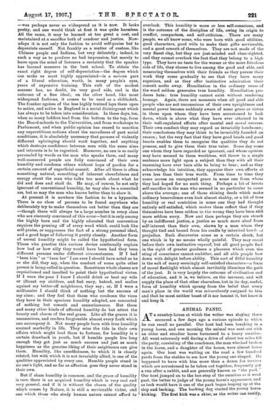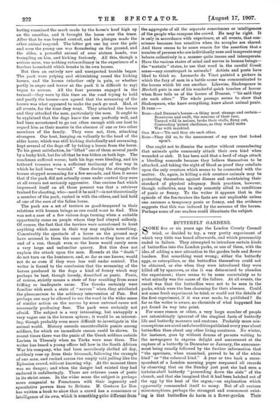ANIMAL PANIC.
AT a country-liouse at which the writer was staying theme occurred a few days ago a curious episode to whitAt he can recall no parallel. Our host had been breaking in a poling horse, and one morning the animal was 'sent out with an older and steadier horse harnessed to a heavy omnibus. All went extremely well daring a drive of about ten miles till the party, consisting of the coachman, the man who had broken in the horse, and a daughter of the house, were almost home again. Our host was waiting on the road a few hundred yards from the stables to see how the young one shaped. Ile happened to have with him more than a dozen fox terriers which are accustomed to be taken out together, frequently get a run after a rabbit, and are generally known as " the pack." Our host jumped on to the box-step of the omnibus as it went past, the better to judge of the young horse's appearance, and as luck would have it one of the pack began leaping up at the step and barking.. The barking dog started the young horse I kicking. The first kick was a skier, as the writer can testify,
hating examined the mark made by the horse's hoof high up on the omnibus, and it brought the horse over the trace. After that he was beyond control, and his plunges made the other animal respond. The latter got one leg over the pole and soon the young one was floundering on the ground, and the elder, a powerful animal of over sixteen hands, was trampling on him, and kicking furiously. All this, though a serious mess, was nothing extraordinary in the experience of a fearless household which breaks in its own horses.
But then an entirely new and unexpected trouble began. The pack were yelping and skirmishing round the kicking horses, and the horses (whether only in pain, or whether partly in anger and terror at the pack it is difficult to say) began to scream. All the four persons engaged in the turmoil—they were by this time on the road trying to hold and pacify the horses—are agreed that the screaming of the horses was what appeared to make the pack go mad. Mad, at all events, for the time they went. They attacked the horses and they attacked the men, particularly the men. It ought to be explained that the dogs knew the men perfectly well, and had been accustomed to go out often enough with our host to regard him as their master in the absence of one or two other members of the family. They were not, then, attacking strangers. Our host, hanging on valiantly to the head of the older horse, which was still kicking diabolically and screaming, kept several of the dogs off by taking a lesson from the horse. To his great satisfaction, he "lifted" one of them several yards by a lucky kick, but for all that he was bitten on both legs. The coachman suffered worse; both his legs were bleeding, and his tattered trousers were a sufficient testimony of the way in which be had been "worried." Once during the struggle the horses stopped screaming for a few seconds, and then it seems that if the pack did not actually come under control they were at all events not seriously aggressive. One curious fact which impressed itself on all those present was that a retriever trained for shooting, who—need it be said ?—is not theoretically a member of the pack, rushed in with the others, and laid hold of one of the ears of the fallen horse.
The pack are a set of terriers as good-tempered in their relations with human beings as one could want to find. This was not a case of a few vicious dogs turning when a suitable opportunity came on people whom they had obeyed sullenly. Of course, the fact that the terriers were accustomed to hunt anything which came in their way may explain something. Conceivably the spectacle of a horse on the ground may have aroused in them the same instincts as they have at the end of a run, though even so the horse would surely seem a very large and unfamiliar quarry. But this does not explain the attack upon the men. Hounds at the " death " do not turn on the huntsmen, and, so far as one knows, would not do so even if they were less well under control. The writer is forced to the conclusion that the screaming of the horses produced in the dogs a kind of frenzy which may perhaps be best, though loosely, described as panic. Panic, of course, strictly means a state of fear resulting from some trifling or inadequate cause. The Greeks certainly were familiar with such a state of " nerves " when they attributed the phenomenon to the arbitrary intervention of Pan. But perhaps one may be allowed to use the word in the wider sense of similar action on the nerves by some external cause not necessarily producing fear. The pack were certainly not afraid. The subject is a very interesting, but unhappily a very vague one in the human sphere ; it would be as interest- ing, though probably even more difficult to investigate in the animal world. History records uncontrollable panics among soldiers, for which no immediate reason could be shown. In recent times there was the panic of the Greek soldiers outside Larissa in Thessaly when no Turks were near them. The writer has heard a young officer tell how in the South African War his company, who had been mercilessly shelled all day, suddenly rose up from their bivouack, following the example of one man, and rushed across the empty veld yelling like the Ephesian crowd, without knowing why. At the moment there was no danger; and when the danger had existed they had
endured it unfalteringly. These are extreme cases of panic in its strict sense. In the wider sense the subject is perhaps
more congenial to Frenchmen with their ingenuity and speculative powers than to Britons. M. Gustave Le Bon has written a book to show that a crowd has a conscience or intelligence of its own, which is something quite different from
the aggregate of all the separate consciences or intelligences of the people who compose the crowd. He may be right. It is only in accordance with experience, at all events, that con- science becomes less sensitive when its scruples are shared. And there seems to be some reason for the assertion that a number of persons who are individually sane and temperate may
behave collectively in a manner quite insane and intemperate. Have the various states of mind and nerves in human beings—
the "ecstatic" states, to use that word in the careful Greek sense—any counterpart in animals P Artists and poets have liked to think so. Leonardo da Vinci painted a picture in which the fury of men in a battle scene was communicated to
the horses which bit one another. Likewise, Shakespeare in Macbeth puts in one of his wonderful quick touches of horror
when Ross tells us of the horses of Duncan, " 'tis said they ate each other." The whole passage seems to show that Shakespeare, who knew everything, knew about animal panic. It runs :—
Ross—And Duncan's horses—a thing most strange and certain— Beauteous and swift, the minions of their race,
Turned wild in nature, broke their stalls, flung out, Contending 'gainst obedience, as they would make War with mankind.
OLD MAN—'Tis said they ate each other.
Ross—They did so, to the amazement of my eyes that looked upon't.
One ought not to dismiss the matter without remembering that animals quite commonly attack their own kind when wounded or sick. It has been said that a herd of stags attack a bleeding comrade because they believe themselves to be attacked, and taking the sight of blood as proof they retaliate
upon the only creature which seems to be connected with the matter. Or, again, in killing a sick creature animals may be protecting themselves against disease and maintaining their standard of physical adequacy. Such practices, however, though collective, may be only remotely allied to conditions of panic or frenzy. To the writer it appears that in the episode of the fox-terriers the facts are not explicable unless one assumes a temporary panic or frenzy, and the evidence suggests that this was induced by the screams of the horses. Perhaps some of our readers could illuminate the subject.



































 Previous page
Previous page